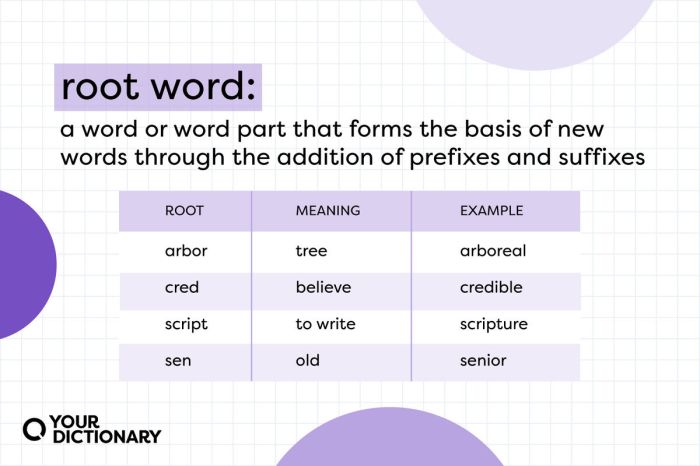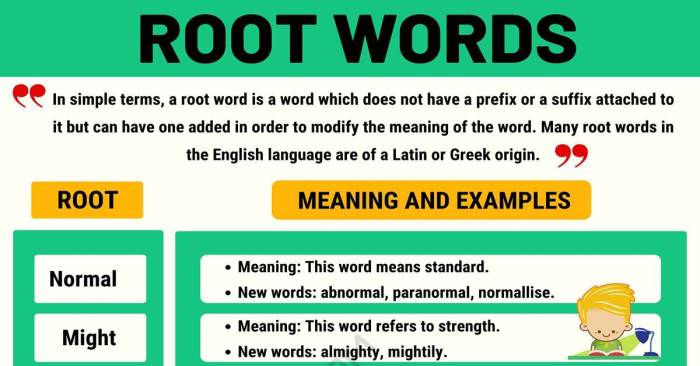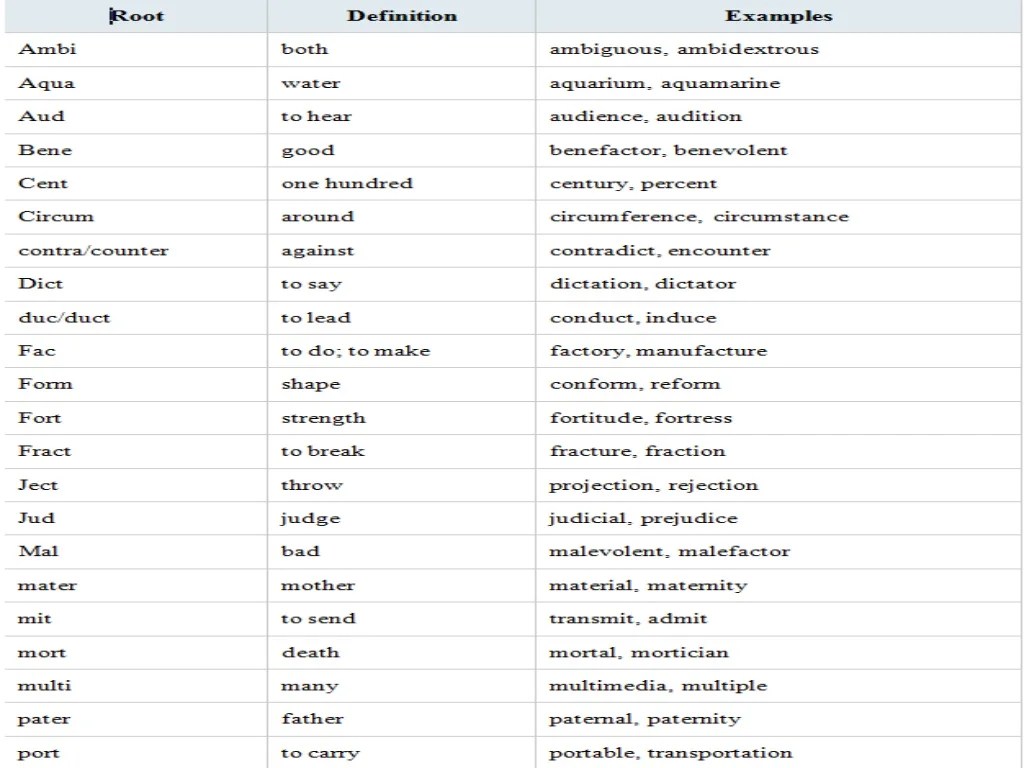Words with the root amo – Words with the root ‘amo’ permeate our language, carrying with them a rich tapestry of meanings and etymological connections. From the Latin ‘amo’ meaning ‘to love’ to its diverse manifestations across languages, these words invite us on a journey into the depths of language and culture.
In this exploration, we will delve into the etymology of words with the root ‘amo’, uncovering their origins and evolution. We will then examine their semantic field, identifying the shared meanings and connotations that unite them. Furthermore, we will analyze their morphological structure, exploring how affixes and derivational processes contribute to their formation.
Etymology of Words with Root ‘Amo’

The Latin root ‘amo’ means “to love.” It is believed to have originated from the Proto-Indo-European root
h₂meh₂-, which also means “to love.” The root ‘amo’ has evolved in different languages, giving rise to a variety of words related to love and affection.
Examples of Words with Root ‘Amo’ in Different Languages
In English, some common words that share the root ‘amo’ include:
- Amicable: friendly, characterized by love or goodwill
- Amorphous: lacking a definite form or structure, like love
- Amatory: relating to or expressing love, like a love letter
In other languages, words with the root ‘amo’ also exist, such as:
- Amour(French): love, affair
- Amare(Italian): to love
- Amor(Spanish): love
These examples illustrate how the root ‘amo’ has been used to create words that express various aspects of love and affection across different languages.
Semantic Field of Words with Root ‘Amo’

Words with the root ‘amo’ share a common semantic field related to love, affection, and strong emotional attachment. They encompass a range of meanings and connotations that express various aspects of love, including romantic love, familial love, friendship, and self-love.
Categories of Words with Root ‘Amo’
Words with the root ‘amo’ can be categorized into different types based on their semantic relationships:
- Emotions:Words that directly express emotions of love, affection, or endearment, such as amor(love), amare(to love), and amator(lover).
- Relationships:Words that describe relationships characterized by love and affection, such as amicus(friend), amita(aunt), and amorosus(amorous).
- Qualities:Words that attribute qualities of love and affection to individuals or things, such as amabilis(lovable), amabilissimus(most lovable), and amans(loving).
- Actions:Words that denote actions or behaviors motivated by love, such as amare(to love), amare(to kiss), and amanter(lovingly).
Morphological Analysis of Words with Root ‘Amo’: Words With The Root Amo
Words with the root ‘amo’ exhibit a range of morphological structures, reflecting the interplay of affixes and derivational processes that shape their meaning and usage.
Affixes, such as prefixes and suffixes, attach to the root to modify its meaning or grammatical function. For instance, the prefix ‘in-‘ in ‘inamorata’ negates the root, conveying the opposite of ‘love’. The suffix ‘-tion’ in ‘amorous’ converts the adjective ‘amorous’ into a noun, denoting the state or quality of being in love.
Derivational Processes
Derivational processes also contribute to the formation of words with the root ‘amo’. One common process is conversion, where a word changes its grammatical category without the addition of affixes. For example, the noun ‘love’ can be converted into a verb (‘to love’) without any morphological change.
Another derivational process is compounding, where two or more words are combined to form a new word with a distinct meaning. The compound word ‘lovesick’ combines the root ‘amo’ with the adjective ‘sick’ to describe a state of intense longing for someone.
By examining the morphological structure of words with the root ‘amo’, we gain insights into the intricate ways in which language shapes meaning and communication.
Words with the root “amo” often convey a sense of love or affection. The case of Prentis v. Yale Mfg. Co. involved a dispute over a contract, highlighting the importance of careful consideration in contractual agreements.
Returning to the realm of words, “amo” continues to play a role in expressing the emotions that bind us.
Syntactic Patterns of Words with Root ‘Amo’

Words with the root ‘amo’ exhibit distinct syntactic patterns, indicating their grammatical roles and functions within sentences. These patterns provide insights into the semantic relationships between these words and other elements in a sentence.
Grammatical Functions
- Nouns:Amo-based nouns typically denote abstract concepts or qualities related to love, such as amor(love), amicus(friend), and amator(lover).
- Verbs:Amo-based verbs express actions or states associated with love, such as amare(to love), amicare(to befriend), and amabilis(lovable).
- Adjectives:Amo-based adjectives describe qualities or attributes related to love, such as amans(loving), amicabilis(friendly), and amabilis(lovable).
- Adverbs:Amo-based adverbs modify verbs or adjectives, expressing the manner or degree of love, such as amanter(lovingly), amice(amicably), and amabiliter(lovably).
Discourse Analysis of Words with Root ‘Amo’

Words with the root ‘amo’ play crucial discourse functions in various texts. They contribute significantly to text coherence, cohesion, and rhetorical effects, shaping the overall meaning and impact of the written or spoken language.
Discourse Functions of Words with Root ‘Amo’
Words with the root ‘amo’ perform several discourse functions, including:
- Establishing Relationships:These words help establish connections between ideas, concepts, and events, creating a logical flow of information.
- Expressing Opinions:They convey the author’s or speaker’s stance on a topic, influencing the reader’s or listener’s perspective.
- Creating Emphasis:By using words with the root ‘amo,’ writers and speakers can emphasize specific points or arguments, drawing attention to their importance.
- Maintaining Cohesion:These words contribute to the coherence of a text by linking ideas and ensuring a smooth transition between sentences and paragraphs.
Examples of Discourse Usage
Here are some examples of texts that demonstrate the discourse usage of words with the root ‘amo’:
- In an argumentative essay:“Moreover, it is imperative that we consider the economic implications of this policy. By implementing these measures, we can ameliorate the financial burden on businesses and stimulate economic growth.”
- In a persuasive speech:“My fellow citizens, I implore you to embrace this opportunity. By voting for this initiative, we can ameliorate the lives of countless individuals and create a more just and equitable society.”
- In a literary work:“The protagonist, driven by a deep sense of love, embarked on a perilous journey. Their unwavering devotion and determination propelled them through countless obstacles, ultimately leading to a triumphant outcome.”
Cultural and Historical Significance of Words with Root ‘Amo’

Words with the root ‘amo’ hold immense cultural and historical significance, shaping beliefs, values, and practices across various societies and eras. Their presence in ancient texts and artifacts provides valuable insights into the evolution of language and its impact on human civilization.
Historical Texts and Artifacts, Words with the root amo
The root ‘amo’ appears in numerous historical texts, including religious scriptures, legal documents, and literary works. For instance, in the Bible, the word “love” (derived from ‘amo’) is a central concept, emphasizing the importance of compassion, charity, and forgiveness. Similarly, in ancient Greek philosophy, the concept of ‘agape’ (unconditional love) played a crucial role in shaping ethical and moral values.
Archaeological artifacts also provide evidence of the cultural significance of words with the root ‘amo’. In Roman inscriptions, the phrase “amo te” (I love you) is commonly found, indicating the prevalence of romantic love and affection in ancient Roman society.
Moreover, the concept of ‘amor patriae’ (love of country) has been a driving force behind patriotism and national identity throughout history.
Commonly Asked Questions
What is the origin of the root ‘amo’?
The root ‘amo’ originates from the Latin verb ‘amare’, meaning ‘to love’.
What are some examples of words with the root ‘amo’?
Examples include ‘amor’ (love), ‘amicus’ (friend), and ‘amabilis’ (lovable).
How do affixes impact the meaning of words with the root ‘amo’?
Affixes can modify the meaning of these words, such as ‘in-‘ in ‘inamorata’ (female lover) or ‘-ment’ in ‘enamorment’ (infatuation).